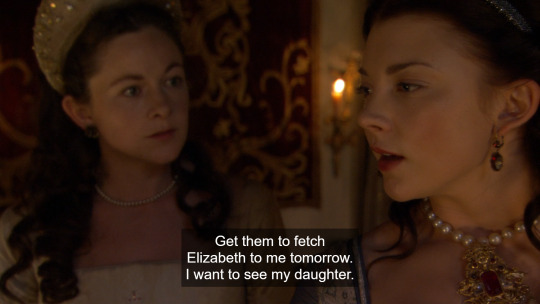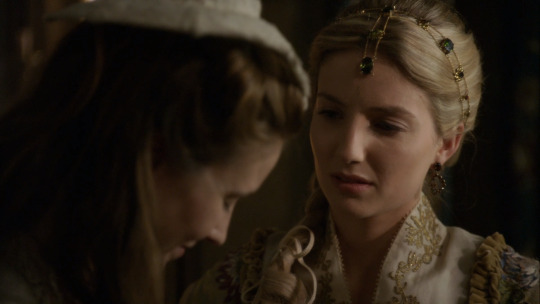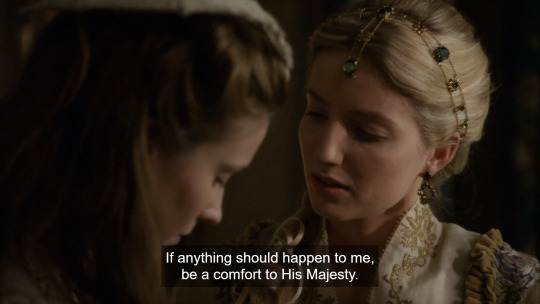#i mean i guess. henry promoted her family as he did her predecessor's
Explore tagged Tumblr posts
Text









things that make you go hmmm.
#this scene should have been with matthew parker but i mean. im glad it was included somehow#but the personality change from s2 to s3 is...something. it means that when she returns for the finale that what she says#does not even sound like her or line up with what was (re)established of her character in s3#umm but yeah i would not tell my husband's mistress to take care of him if anything happened to me like. lol. what#i would be like if i die? kill yourself <3#they really just made her Selfless and Nice . no other qualities or flaws except i guess being self-abasing...?#and like no i don't watch television to find characters i can 'relate' to that's just an observation#but really it narratively makes no sense is my bigger issue with it#what has henry done for her to have earned that sort of selfless devotion . literally nothing#given her a puppy? looked at her and smiled while she was washing her hair?#whereas with her predecessors at least you get their sense of bond#in s1 henry is favouring the alliance catherine wants they have the bond over their daughter and there's the sense of their shared past#and joys at least...#for anne they have fought for so long to be married and the bond of their child again and religion#hirst was a menace. i hate this show fr sometimes#i mean i guess. henry promoted her family as he did her predecessor's#but it still doesn't feel earned bcus despite that there's so little regard for them?#she finds out her father died and that she can't even go to the funeral. so . like . again......#the tudors
14 notes
·
View notes
Note
Hi! I was reading "Later Plantagenet and the Wars of the Roses Consorts" and I was wondering what you thought of the conclusion they made in their epilogue "Foreign Women as Consorts" where they argued that "the real 'break with the tradition of foreign consorts comes with Anne Neville rather than Elizabeth Woodville, who could be seen as a more liminal or transitional figure"?
While they acknowledge the fact that after Anne's death, Richard was seeking a foreign consort and would have married one had he won Bosworth, I think this conclusion is drawn from a very limited framework which doesn't consider other aspects of Anne Neville. Namely the fact that she married Richard III far before his ascension/usurption to kingship (nor was he ever expected to become king during that time) rather than after, meaning that her queenship was less of a startling choice and more of an obvious expectation. Not to mention the fact that she was a very wealthy and powerful heiress in her own right, making her marriage directly advantageous and traditional to Richard III in a way that the marriages of Elizabeth Woodville and Henry VIII's wives were simply not. I also highly doubt that (and I apologize if this sounds crass) Anne's extremely short tenure as queen would have caused as much of an impact on the nature of foreign/English queenship as this conclusion assumes.
Moreover, while Elizabeth Woodville's Burgundian uncle attended her coronation and she used her mother's lineage in heralds, in practise her relatively distant foreign connections meant little to nothing for her queenship. She was born and raised in England, her father was part of the English gentry, and she was factually the first Englishwoman to be crowned queen since the Norman Conquest (which, along with her social status, should automatically make her the 'break in tradition', imo). Edward's marriage to her certainly brought him no direct foreign alliance or even national connections to the extent that Anne Neville's did. Nor could Elizabeth draw foreign support in times of crises like Margaret of Anjou or Catherine of Aragon could; her only choice was to flee to sanctuary.
I guess ultimately, I think the conclusion they've drawn regarding Anne Neville is a little strange and I mostly disagree with it? Anne's marriage to Richard prior to his ascension makes her an interesting and unique consort (and reminds me of Mary de Bohun who died before Henry's usurption), but her immense connections and wealth undercuts any assumption of a 'break' from her end, as a marriage to Anne offered immense (national) benefits along the same lines as foreign consorts did. Elizabeth strikes me as the far more obvious choice for a "break" in the tradition of queenship, even more so given her comparatively lower social status. The fact that she was "a liminal and transitory" figure, as the chapter says, and could be seen as a precedent to Anne, should be argument enough that if the 'break' began with one person, it should ideally be her.
Idk, what do you think?
Hi! I agree. Although I don't think the break in the tradition of choosing foreign consorts was ever definitive or the start of a standard of native British consorts (after all, after Henry VIII all consorts were foreigners until 1936), if we're choosing anyone to be the one to break tradition it was Elizabeth Woodville. Woodacre's whole argument is:
[...] The comparisons have revealed that Elizabeth Woodville shared more common ground than might be expected with her foreign predecessors given her Burgundian heritage and the opprobrium that she received due to the promotion of her family. While the Rivers Woodville clan might not have been foreigners, the resentment caused by their increased power and influence and the advantageous marriages that they made demonstrate that the root cause of the criticism of the queen’s family at court was not necessarily rooted in xenophobia, rather jealousy that the queen’s relatives had an unfair advantage to boost their careers and finances over that of other noble houses and courtiers. Given these similarities with the situation of previous queens, it could be argued that the real “break” with the tradition of foreign consorts comes with Anne Neville, rather than Elizabeth Woodville, who could be seen as a more liminal or transitional figure between foreign and native brides.
I wanted to highlight that part because yes, the Woodvilles were not foreigners, the prejudice they were subjected to was classism, not xenophobia. It's important to discern between the two, and as Laynesmith argued in the Elizabeth Woodville chapter, the Woodvilles have been courtiers and servants of the crown since Edward III. They weren't the family of a foreign queen who suddenly had to be integrated into the land: Elizabeth's father and brother were barons in their own right and had been famous servants/supporters of Henry VI when Edward IV came to the throne. Their elevation to even more positions of prestige caused discontent among some, but it was not the process of integrating foreigners into a court they didn't know. As you said, although Edward IV used Elizabeth's foreign relatives to gloss up her standing, they weren't an available financial and military network that Elizabeth could tap into in times of crisis.
I think this volume's analysis suffered from leaving out Elizabeth of York (even if her chapter was allocated to the Tudor Consorts volume, I don't see why she should have been excluded from the convo about the impact of the Wars of the Roses on queenship altogether). For example, she and Anne Neville had a lot in common in their situation when it came to the support they were able to gather for their husbands. As Laynesmith once said, 'Whereas identification with Anne Neville's kin gained Richard III the support of his northern subjects, identification with Elizabeth of York's kin aided Henry VII in gaining an entire kingdom'. It was not a deliberate break with tradition, so much so both Richard III and Henry VII looked for foreign brides after the demise of their wives, and actively sought foreign brides for their heirs.
It wasn't a deliberate choice to break with the advantages that foreign marriages could bring, it was a necessity created by internal war as much as external wars had dictated the choice of foreign brides, as pointed out by Nigel Saul. Of course, this outlook is more valid when it comes to Anne Neville's first marriage to Edward of Lancaster because it truly entailed becoming queen and bringing a whole political party to support her husband's claim, whilst Anne's marriage to the king's brother, as anon pointed out, was never meant to put her into the position of queenship. Anon's comparison with Mary de Bohun was very apt in my opinion too. Anyways, I agree with you, anon.
#ask#anon#elizabeth woodville#anne neville#elizabeth of york#woodville tag#historian: elena woodacre#historian: j. l. laynesmith#historian: nigel saul
17 notes
·
View notes